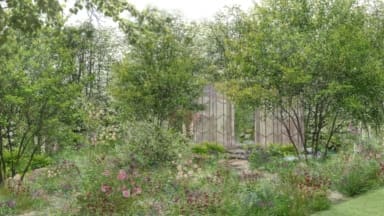
The Glasshouse provides horticultural training and employment to women in prison alongside resettlement support as they approach the end of their sentence. The Glasshouse has a 0% reoffending rate, which considering that the average re-offending rate among women is 58% (Prison Reform Trust) is a clear demonstration of how building purpose, self-belief and hope for the future can break the re-offending cycle.
Funded by Project Giving Back, the RHS Chelsea show garden celebrates the support, inspiration and hope the Glasshouse provides to women in custody. Inspired by the women supported by the transformative programme, the garden will be centred around a translucent pavilion emerging from the foliage and promises to be an immersive, hopeful and reflective space.
The women in The Glasshouse programme asked the designer, Jo Thompson, to bring a series sensory delights into the garden – the ability to see and hear water, to smell fragrant plants and to be inspired by nature’s beauty. A narrow rill will wind its way through the garden connecting different areas and ending in a tranquil pool. The planting is rich and full of texture, and includes multi-stemmed Betula nigra, Euonymus alatus, ferns, grasses and roses, as well as marginal and aquatic species. The planting colour palette is inspired by the notion of ‘strong beauty’ in a palette of deep reds and muted pinks, combined with highlights of Thompson’s signature colour palettes.
An elliptical pavilion, designed in collaboration with architects from the Hollaway Studio is centred in the garden. The uplifting structure is a space for the women to gather – for meetings, training and planning for the future – and will be made from recycled acrylic given a touch of jewel-like enhancement to compliment the colour palette of the planting in the garden. The garden will be built by Ryan Alexander Associates and plants will be supplied by; Form Plants, Hardy’s Cottage Garden Plants, How Green Nursery, David Austin Roses, Peter Beales Roses and Jekka’s Herbs. The Water Artisans will be creating the water features in the garden.
Kali Hamerton-Stove, co-founder of The Glasshouse, said: “It is an incredible opportunity to work with Jo and Project Giving Back to create a space where women in prison will start on a journey to change their lives and create their second chance. Once the garden is re-located in the prison, The Glasshouse can extend its work, training more women in all aspects of our horticulture business, providing award-winning interior plant design, installation and maintenance. Our current team of women have already learned so much from Jo as she’s planned the design of the garden and we look forward to growing our impact to benefit a new community of women working to change their future.”
Jo Thompson has won multiple awards at the RHS Chelsea Flower Show – four Gold and five Silver Gilt medals to date. In 2017 she won the People’s Choice award at the first RHS Chatsworth Flower Show. She is a member of the RHS Gardens Committee and is Garden Advisor for RHS Rosemoor, as well as being a member of the RHS Show Gardens Selection Panel and an RHS Shows Judge. A tutor at the London College of Garden Design, Thompson is a Fellow of the Society of Garden Designers and the Landscape Institute, and a Trustee of Bankside Open Spaces Trust.
Thompson said: “What a wonderful opportunity to return to RHS Chelsea Flower Show with this garden for The Glasshouse. It has been very moving to learn first hand how horticulture can be embedded within the prison environment to provide mental and emotional benefits and to help change outcomes and cut re-offending. I am really honoured to be embodying The Glasshouse message of hope and second chances in this garden and to be making a garden that will live on beyond the show as a new growing and training centre delivering new futures for the women it touches.”
After the show, the garden will be re-built in a women’s prison in the South of England where it will provide a nurturing space for training and planning second chances for a new community of women.

